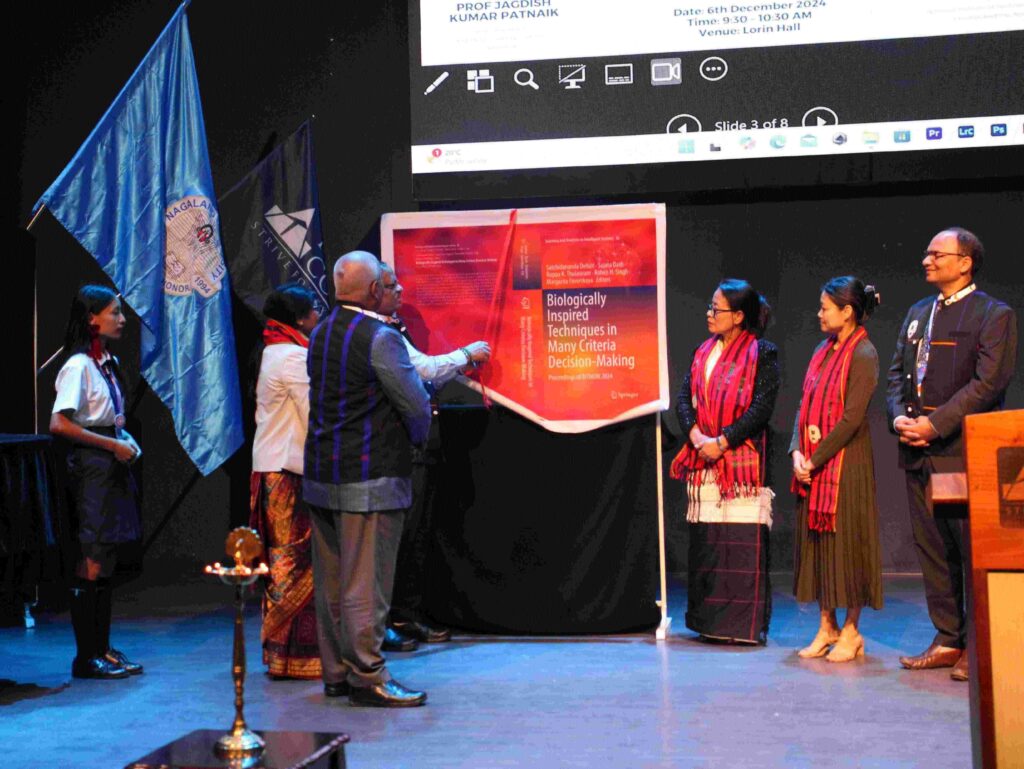
The School of Engineering and Technology at Nagaland University, in collaboration with Tetso College, Dimapur, hosted the international conference “Biologically Inspired Techniques in Many-Criteria Decision-Making (BITMDM 2024)” on December 6th, 2024, in a hybrid format. The two-day conference (December 6th-7th, 2024) commenced with an inaugural ceremony at Lorin Hall, Tetso College, focusing on “Advances in Multidisciplinary Research and Innovation.” Professor Jagdish K. Patnaik, Vice Chancellor of Nagaland University, served as the chief guest and Professor A. Elayaperumal, Director of the National Institute of Technology, Nagaland, delivered the keynote address.
Professor Prabhakar Sharma, Organizing Committee Member, Nagaland University, presided over the session with Er. Shanchamo Yanthan, Assistant Professor of IT, Nagaland University, serving as co-chair. Professor Sujaata Dash, Programme Chair, BITMDM 2024, Nagaland University, delivered the welcome and introductory address. She emphasized that this conference provides a forum for experts, researchers and practitioners from various fields to explore advancements in biologically inspired techniques and data analytics for addressing the complexities of multilateral decision-making. She noted the significant global participation and following a rigorous peer-review process (two reviewers per paper) highlighted the selection of 48 high-quality papers for presentation out of 137 submitted papers, which will be published in the prestigious Springer as conference proceedings. She also mentioned a two-hour tutorial on practical machine learning offered to attendees during the two-day conference. The program will encompass ten technical sessions across six tracks. She expressed appreciation to the sponsors, Springer and the Department of Science and Technology, Government of India.
Professor A. Elayaperumal, the Chief Speaker and a highly qualified and experienced surface engineering expert noted that historically, all inventions originate from biological principles. He further discussed how economic and social progress are driven by advancements in education; in essence, education is the catalyst for all development, fuelled by high-quality research and development. He stressed the importance of valuing our research and development efforts, ensuring they yield commercial benefits. Technological advancements and product innovation should enhance human convenience and comfort; however, this improved lifestyle has detrimental effects, leading to biological and psychological issues that have reshaped societal functions. While innovation is crucial for economic growth, investment in research and development and education should remain the primary focus for comprehensive progress.
He also pointed out that today many Naga youths are too comfortable and they tend to stay back in Nagaland. We should train and educate our youths in such a way that they can be comfortable in competing with the people from outside the state and beyond.
He noted that while the healthcare sector has experienced significant advancements, new diseases continue to emerge, necessitating the development of novel medicines through investment in bioscience and biotechnology. This presents a unique opportunity for Northeast India given its abundant forest resources rich in medicinal plants. Harnessing these resources for economic benefit requires robust research and development. Such innovation can substantially improve social welfare and contribute significantly to public health, education, infrastructure and overall quality of life. He ended the speech by citing a paradoxical statement “medicine technology has developed medicine, number of medicine has developed, number of doctors has increased, number of hospitals has increased dissimilarly, number of diseases also increased” attributing primarily to lifestyle changes and the resulting prevalence of lifestyle diseases. Because of lifestyle changes there are a lot of lifestyle diseases. Therefore, in addition to economical, educational and social development, we should take care of our physical development, mental health and emotional health which are the three pillars of our life.
Professor Jagadish K. Patnaik, Vice Chancellor of Nagaland University, joined in the inaugural session via video conference and delivered a short speech. He emphasized the conference theme’s contemporary relevance, highlighting technology’s role in governance and international relations. He noted that artificial intelligence, considered the fourth industrial revolution, is driving advancements across all facets of human life. However, he posed the critical question: are we happier than our ancestors? He further observed that AI’s progress presents novel challenges, necessitating innovative solutions, techniques, and interventions.
The conference was officially declared open by Prof. V K Vidyarthi, Dean SET, Nagaland University after the vote of thanks delivered by Er. Shanchamo Yanthan, Assistant Professor of IT, Nagaland University.
